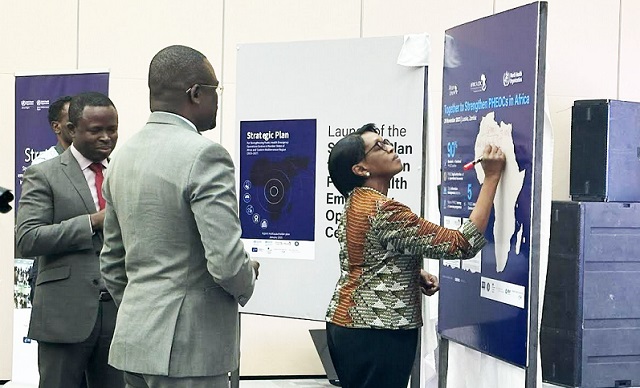
Kampala, Uganda | RONALD MUSOKE | The Africa Centres for Disease Control and Prevention (Africa CDC) and the World Health Organisation have entered into a partnership to halt disease outbreaks that are common across the continent.
Every year, close to 100 disease outbreaks are reported across Africa according to research from the Africa CDC–an autonomous agency within the African Union structures whose mandate is to strengthen the capacity of countries to respond quickly and effectively to disease threats across the continent.
Dr. Jean Kaseya, the Director General of the Africa CDC told delegates attending the 3rd International Conference on Public Health from Nov.27-30 in Lusaka, Zambia, that the Africa CDC and WHO have a strategic plan to strengthen public health emergency operations centres across the continent.
“This (strategic plan) is in pursuit of our shared commitment to establish a minimum of 90% of Public Health Emergency Operations Centres in member states within Africa and the eastern Mediterranean region,” he said on Nov. 29.
Dr. Matshidiso Moeti, the WHO Regional Director for Africa said the visionary plan seeks to establish fully operational Public Health Emergency Operations Centres (PHEOCs) in at least 50 African countries. “This strategic initiative is a leap toward enhancing regional health preparedness and response,” she said.
The conference held under the theme, “Breaking Barriers: Repositioning Africa in the Global Health Architecture,” attracted thousands of health experts and leaders from around the continent. They agreed that learning and planning from past outbreaks would ensure proactive preparedness when facing future health challenges.
Potential game changer
Public health experts have welcomed the strategy calling it a “potential game changer” for Africa’s regional health preparedness and response.
“It’s a crucial step towards ensuring a safer and healthier Africa,” said Dr. Francis Ohanyido, a fellow of public health at the West African Institute of Public Health.
“The rising frequency of public health emergencies burdens our continent,” said Dr. Fiona Braka, the Team Lead, Emergency Operations at the WHO Africa Region Office, “Governments identify priorities and problems (and) as partners, we (should) unite to support them.” “It’s an all-hands-on-deck situation because tackling this alone is unachievable,” she said.
In May this year, Africa CDC and WHO launched a five-year Joint Emergency Preparedness and Response Action Plan (JEAP) that emphasises the shared vision of Africa’s two leading public health institutions – to strengthen emergency preparedness and response and health systems on the continent.
“JEAP will bolster our collective efforts to fight public health emergencies, saving lives and protecting our communities,” Dr. Moeti said in May.
Priority areas of action under JEAP include; strengthening surveillance, intelligence and genomic sequencing for quicker detection, stockpiling emergency supplies at newly established sub-regional hubs to improve emergency response operations (70% of response activities during emergencies relate to such supply chain measures), and deploying first responders within 24-48 hours of a disease outbreak.
The JEAP intends to serve as a guiding beacon for targeted emergency response interventions and embodies the importance of cross-cutting collaboration, knowledge sharing, and resource mobilisation.
In 2022, during a meeting in Lusaka, Zambia, which was convened to strengthen public health emergency operations centres in Africa, Moussa Faki Mahamat, the African Union Commission Chairperson said in light of the resources constraint—financial, infrastructure, scientific and others— it is also important that Africa considers pooling its efforts and approaches.
“Instead of working in separate individual silos, it will be more beneficial if we act in terms of regional centres catering for many countries in the region and maximise all efforts and chances of greater success,’ he said.
He said the benefits of effective Public Health Emergency Operations Centres have been seen in the identification and rapid control of disease outbreaks such as Ebola, Polio, Yellow Fever, Cholera and others. He said the centres would be responsible for collecting and producing data and evidence for rapid responses to disease threats.
“They will form the backbone of our early warning systems so that no outbreaks will be allowed to spread and cause harm to large segments of our populations,” he said.
Dr. Wessam Mankoula, the Lead of Africa CDC’s Emergency Operations Centre said one of the key goals of the public health emergency operations centres is to ensure that by the end of the next five years, at least 90% of Africa’s population have functional public health emergency centres.
“It’s time for us to take control with a coordinated effort using the Joint Emergency Preparedness and Response Plan,” said Dr. Radjabu Bigirimana, the Africa Volunteer Corps (AVoHC) Programme Lead at the Africa CDC.
“We have to leverage on the power of human creativity to build resilient health systems,” said Dr. Paul Ngwakum, the Regional Health Advisor at UNICEF for Eastern and Southern Africa.
Experts at the Africa CDC say the clamour for public health emergency operations centres were partly in response to the West Africa Ebola outbreak of 2014 and 2016. At the time, it was noticed that the countries affected by the hemorrhagic fever had not invested in early warning systems, monitoring, and data analysis and response. As a result, close to 11, 000 people died during the two outbreaks.
 The Independent Uganda: You get the Truth we Pay the Price
The Independent Uganda: You get the Truth we Pay the Price


